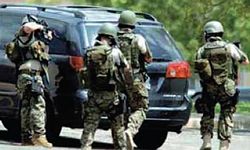Category:948 Incident Response Plan and Emergency Response Management

|
MoDOT’s Safety and Emergency Management Unit supports the core value of “Moving Missourians Safely” by providing planning, training, exercise and implementation of the MoDOT Incident Response Plan. In addition, the Emergency Management staff work to coordinate with internal and external partners while supporting MoDOT’s Emergency Operations Center and providing staffing for the State Emergency Operations Center Transportation Emergency Support Function.
The Incident Response Plan directs the actions of MoDOT personnel in the event of an incident or emergency situation. The plan establishes procedures for conducting effective and coordinated response and recovery operations using resources available to MoDOT. The Incident Response Plan includes chapters regarding Command and Management, Resource Management, Communications and Information Management, Supporting Technologies, and Ongoing Management and Maintenance.
Supplemental Plans include Continuity of Operations, Severe Weather Response, Hazardous Materials Response, Radiological Response, Terrorism Response, Pandemic Influenza Response, Earthquake Response and a Workplace Security Plan.
Additional responsibilities of the Emergency Management staff are:
Disaster Recovery and Reimbursement
Disaster Recovery and Reimbursement includes evaluating damages received from natural and man-made disasters for possible reimbursement from the Federal Highway Administration and the Federal Emergency Management Agency. Staff members may coordinate the gathering of data and costs related to disaster repairs, report to state and federal entities to be included in disaster declarations or reports and oversee the process to request and gain reimbursement for costs incurred from multiple disasters each year.
Traffic Incident Management Training Program
Keeping MoDOT employees and responders safe while working on our roadways is a top priority in Missouri. The number of highway workers and responders who are injured or killed on the highways continues to rise each year. Emergency Management staff are responsible for implementation of MoDOT's Strategic Traffic Incident Management Plan and the Traffic Incident Management Training Program. They oversee the curriculum, qualified trainers, and delivery of courses throughout the state. In addition, this staff provides guidance to several agencies and committees on how to further protect our responders and public when they are impacted by an accident or response on our roads or highways.
One tool that is very beneficial is the MoDOT Strategic Traffic Incident Management Plan. This plan establishes MoDOT’s vision, goals, and objectives for traffic incident management throughout the state as well as a history of how the program has developed. This plan is used throughout the TIM training and was developed as part of MoDOT’s TSMO initiative. More information about TSMO can be found in EPG 909 Transportation System Management and Operations.
MoDOT Statewide Communications System
MoDOT also operates a statewide two-way radio communications system. This system is licensed in the Highway Maintenance and Local Government Public Safety Radio Service and may be referred to as a "dual use" system. Normally it is used for routine highway business but during times of declared emergency it augments Emergency Management and response capabilities. The MoDOT Communications Standard Operating Guideline provides detailed information regarding use of this system.
